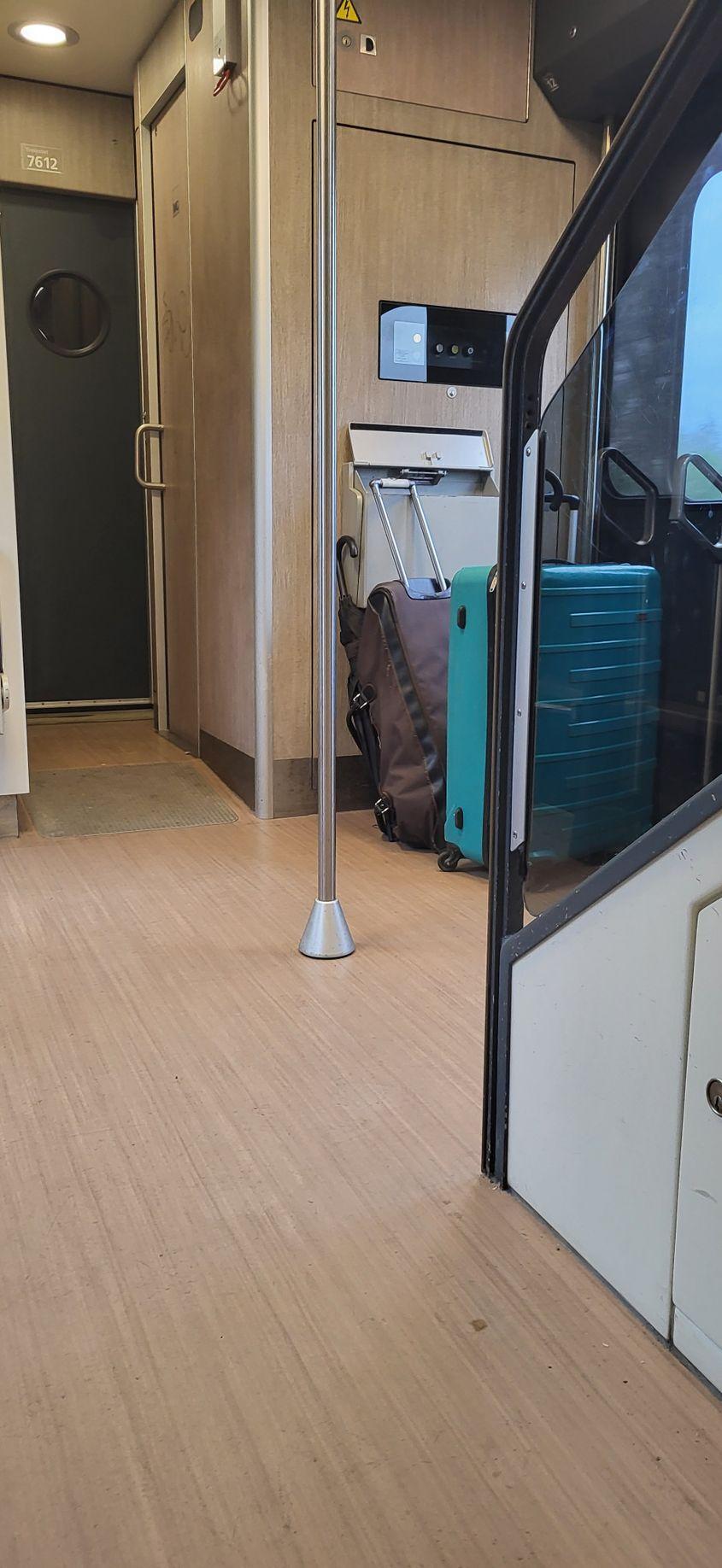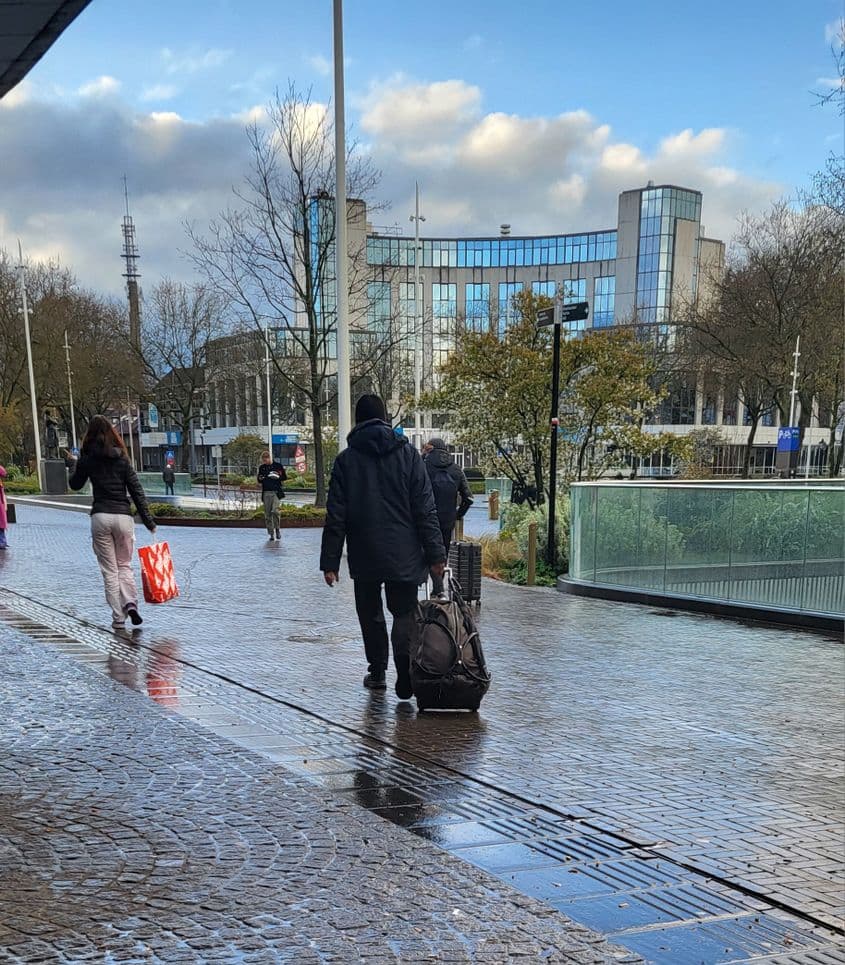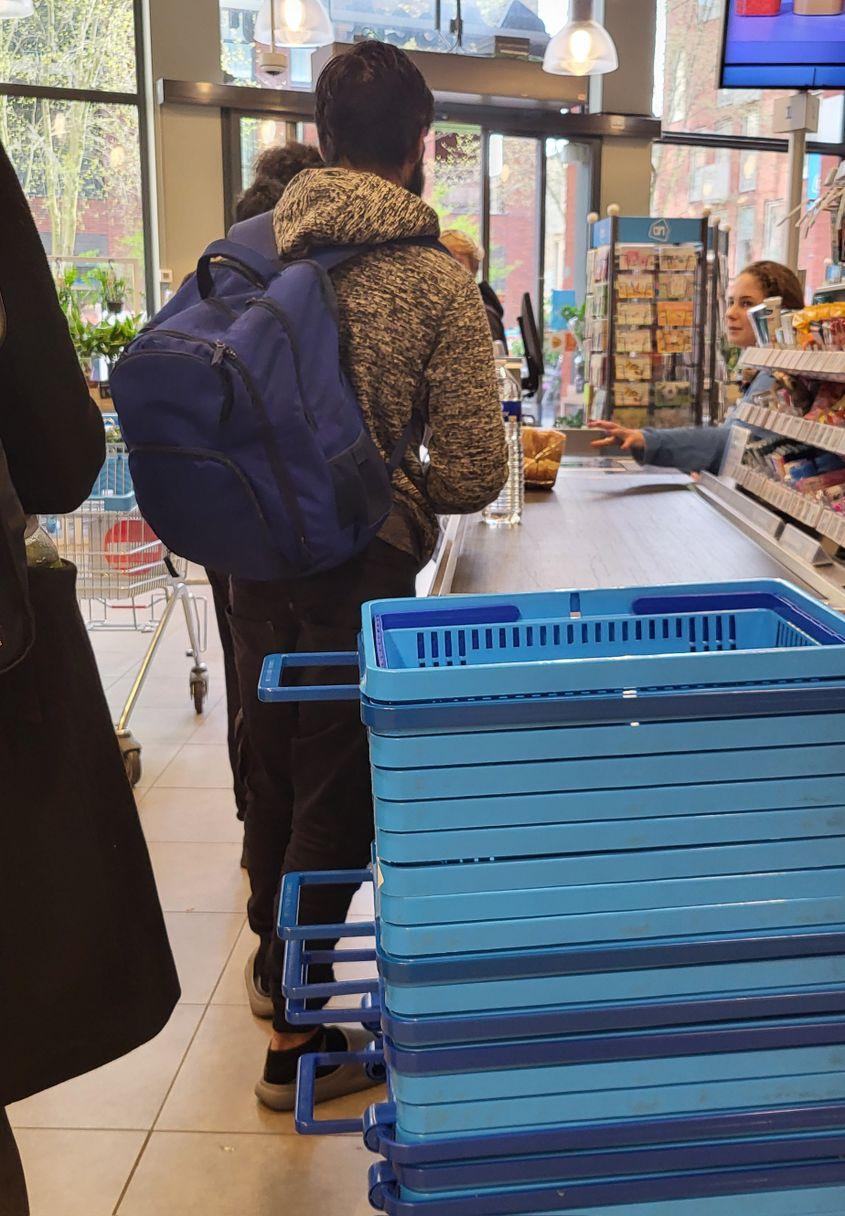In the Netherlands, the regulation of begging depends on each municipality. In Groningen, begging is only prohibited if it is done in an inconvenient way. photo: Ingrid Stefan / PressOne
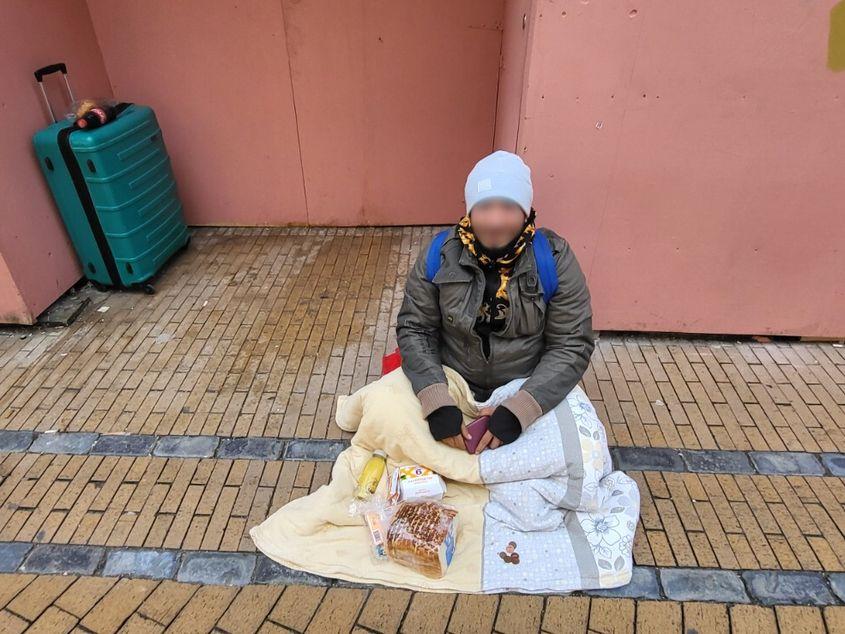
In the Netherlands, the regulation of begging depends on each municipality. In Groningen, begging is only prohibited if it is done in an inconvenient way. photo: Ingrid Stefan / PressOne
29/10/2024
“I’m very hungry, God bless you.” The stories of Romanians in the Netherlands who rely on the kindness of strangers
Hunched over, wearing a thick but patched jacket and a cap, a man stands on Herestraat, one of the busiest streets in Groningen, a Dutch city full of students, holding a sign that reads: „I’m very hungry, God bless you” and a paper cup with a few coins in it.
He mumbles a „thank you” everytime someone drops one or two euros into his cup. He doesn’t talk to anyone and sits quietly in front of a shop. He clutches the corners of a blanket. Not just any blanket - a thick brown one, with flowers, the kind you might see in a grandmother’s house somewhere in Eastern Europe.
Vasile*, whose name has been changed to protect his identity, comes from Piatra Neamț. He is 21 and thin as a reed. His hands are hardened with work. Only his brown eyes can be seen behind layers of thick clothing, with dark circles that speak of the lack of sleep.
Romanians deceived by Romanian employers
Vasile has been in the Netherlands for just over two weeks. He came with his wife to work at a car wash in Utrecht, because an acquaintance from Piatra Neamț recommended it.
They were working for a Romanian employer, who was supposed to pay them weekly. However, Vasile claims he didn’t. That’s how they ended up on the streets, begging strangers for 15-20 euros a day to afford a ticket back home.
At night, they sleep around the train station in Zwolle, a smaller city about an hour away. That’s because shelters for vulnerable people require proof of residence and employment in the Netherlands for at least five years in order to accept someone.
Since it’s a larger city, the couple frequently travels to Groningen by train, although without tickets. „We occasionally get fined, but that’s all. If you don’t stay here for more than a few months, nothing happens because of an unpaid fine.” says Vasile.
Vasile and his wife are not the only Romanians asking for the goodwill of the people living in Groningen. A new face can be spotted on the streets about every two days. They all have the same luggage, the same cardboard sign, and almost the same story: a tip from a friend, a job with no contract, an employer unwilling to pay and the urgent need for money to return to Romania.
I spoke with seven people asking for money on the street in Groningen. All of them come from Piatra Neamț. They say they live on the streets in Zwolle and travel by train, without a ticket, to Groningen. Although they didn’t know each other beforehand, they formed a community after meeting here. Constantin*, another 26-year-old member of the group whose identity remains anonymous, says they learned how to approach strangers for money from one another.
Mulți ne citesc, puțini ne susțin. Fără ajutorul tău, nu putem continua să scriem astfel de articole. Cu doar 5 euro pe lună ne poți ajuta mai mult decât crezi și poți face diferența chiar acum!
Constantin worked illegally for two weeks in demolition jobs at the beginning of March, after a friend of a friend from Piatra Neamț told him about it. He quit when he didn’t receive any pay.
The first time I met him, he was smoking a cigarette in the city center while waiting for the others to come out of a supermarket. A mountain of a man, he wore an XXL puffer jacket with the Jordan logo and a pair of white Fila shoes, in stark contrast to the rusty checkered shopping cart he was pushing.
“I’ve worked in Italy and Spain. In fact, I just returned from Spain, where I had a seasonal job,” he says. “I was supposed to start begging here today because I need money to go back home, but I was too ashamed to do it. I’ve never begged before; I always worked,” he adds.
The next time we met, just a few days later, his eyes were red, as if he hadn’t slept in a while. His jacket was torn, and he was sitting on a street near the University of Groningen, with the cardboard sign, paper cup, and indispensable blanket.
„The blanket and the cardboard are from the other beggars who left. They taught me a few tricks.” He claims that even on a lucky day, he doesn’t get more than 20 euros. And Zwolle isn’t such a good place anymore. „It’s too crowded. There are ten or eleven Romanian beggars just in Zwolle,” he says.
Predator in Robes: The Diocese of Iași and the Vatican Buried a Sexual Assault Committed by a Catholic Priest Against a Minor in Bacău, Failing to Alert Prosecutors
A Roman Catholic priest abused a 13-year-old girl in the parish where he served in Bacău County: the bishop of Iași knew about it, sent the case to the Vatican, and applied canonical sanctions, but did not notify the authorities, who only intervened later and sentenced him to prison.
A new ban on begging in Zwolle
In the Netherlands, each municipality sets its own regulation around begging. In Groningen, begging is only prohibited if it is done in an uncomfortable manner. In Zwolle, there was no ban until March this year, when the municipality issued a new rule: it is prohibited in the designated areas of the city.
The decision states that the number of people appealing to the kindness of passersby has increased since last summer. This conclusion is based on 21 citizen complaints and police observations. It also states that some beggars sleep in public places because they are not residents of Zwolle.
Un newsletter pentru cititori curioși și inteligenți.
Sunt curios
„As of now, the individuals in question are unknown to us. The decision aims to gather information on this matter and to assist those individuals,” says Sam Rademaker, spokesperson for the Zwolle municipality.
Meanwhile, the Groningen municipality has been more proactive. Following reports from last November in local publications about a group of „professional beggars,” the police and local authorities began gathering information.
„We can say that a group of at least six individuals, both men and women of Romanian origin, has been begging in Groningen since the beginning of November,” explains Jan Smale, spokesperson for the Groningen municipality. The group leads a nomadic life and has been seen in various locations across the Netherlands; it’s made up of almost the same people.
„They are regularly seen at the train station in the morning and afternoon. It is suspected that they travel by train,” adds Smale.
I checked this hypothesis on April 4th, by following a group of three Romanians asking for the compassion of passersby in Groningen. At around 6:19 PM, the three boarded a train to Zwolle. They left two shopping carts in the corridor and sat down in first class.
No ticket inspector checked the train that day, but as it turned out, all three actually had tickets, whether for first class or not.
Upon exiting the train station in Zwolle, they each scanned a paper ticket. Paper tickets can only be purchased from a machine at the train station, and a journey from Groningen to Zwolle for an adult in second class costs 21 euros.
They are sometimes seen traveling by car. Frank, a local who is homeless and also begs in Groningen, claims he has seen the Romanians being dropped off early in the morning and picked up in the evening by a white car. The police in The Hague have also noticed that Romanian beggars are being picked up by cars. „In many cases, we see them gathering in parking lots, where more of them sleep in cars,” says spokesperson Suzanne van de Graaf.
A Cinderella story: „In Romania, there are palaces built from this”
Teodor*, 26, who prefers to remain anonymous, confirmed the car travel between Groningen and Zwolle. He says his brother sometimes picks him up.
I found him one afternoon in the same spot where I had met Vasile just a few days earlier. A short but well-built man, bundled up from head to toe in a second-hand jacket and a black hoodie and yellow chains. Unlike the others, he appeared well-groomed, with a bright smile, and had a rather different story.
He came to Zwolle six months ago to work in a slaughterhouse but was fired after two months due to a conflict. His brother couldn’t help him, Teodor claims. Although he is settled down in Zwolle, he had to take care of his own family.
„Let me tell you a secret. Don’t think you can’t make money on the street. There are palaces in Romania built from doing this. Don’t believe that these beggars are starving. They are here to make money,” he says, chuckling somewhat proudly. Teodor claims he makes a few hundred euros a week, if not more, traveling monthly between Romania and the Netherlands, while sending money to his 17-year-old wife and their two children in Piatra Neamț.
However, two months after this, he returned home with just 35 euros in his pocket. The few hundred euros he claimed to earn while begging soon turned into just 30 euros, on a lucky day. Now he works in construction in Piatra Neamț, money down, for 15 euros a day. But he wants to return to the Netherlands, this time with a job and his entire family.
Petty thefts
Eleven years ago, begging was more of a secondary undertaking, usually done by the women and the elderly of the group, while men pickpocketed. Things have changed since then.
From time to time, you still see small thefts from grocery or clothing stores: a pair of shoes, cheese, some ham, bread, or water.
Could these people sleeping on the streets be earning hundreds, if not a thousand euros a week? And if they are, is the money truly theirs, or does it end up with someone higher up in the network? A police officer in Utrecht, whose identity remains anonymous for security reasons, has been studying this phenomenon since August and states that there are no signs of human trafficking or forced begging—at least not yet, based on the conversations police have had with the Romanians.
„There is no official criminal investigation, but they are continuously monitored, both by the police and by human trafficking detectives. Although there are no indications of exploitation, there are signs of coordination, such as the same cardboard signs, strategic begging locations, and the fact that they seem to know each other and travel together,” he says.
“Right now, it’s just just families from Romania doing this to survive. They do it for a few months in the Netherlands and send the money back to relatives in Romania,” he explains, adding that these families made up of couples. “Like migrant workers in Western Europe, they earn much more here than they can earn in Eastern Europe. So for them, it’s just a kind of business model. And they do it in an organized way so they can earn more,” he claims.
Although the police in Utrecht have seen them with cash (10-euro bills and sometimes even 50-euro bills), there are no figures regarding how much money Romanian beggars actually earn.
They have no access to shelters, but they receive plenty of fines: „They have a tough life here”
Barka is a Polish NGO that helps Eastern European workers find jobs or reconnect with their home countries when they end up on the streets in the Netherlands.
Larisa Melinceanu, deputy director and project coordinator at Barka Nederland, is aware of the Romanian beggars and has been in contact with some of them during her 12 years with the organization.
“I tend to believe that these people from Piatra Neamț are just this year's group. Two years ago, there was one from Sibiu. They traveled through France, Belgium, and the Netherlands—and they had some vans, but poor ones, not like the sophisticated cars of the mobsters that are talked about in the newspapers,” she says.
For Larisa, it’s not suspicious that they are all from the same place, as it only takes one or two to come for the rest to follow. It’s a social network.
„I once met a beggar, about 40, with whom I became friends. He showed me pictures of his house on Facebook, with a well-kept garden and two pigs—a beautiful household, but not the famous palaces you hear about. I remember being so surprised by how well taken-care-of his home was that I started to think: is this the price for having a beautiful house? Suddenly, I felt that I understood everything better,” she says.
Over the years, Barka has tried to help the Romanians who appeal to the kindness of Dutch passersby, but it hasn’t had much success.
„We try to tell them that we help people in difficult situations. We show them that there are employment agencies and ask how they ended up in this situation. But as soon as we mention a reintegration plan, they no longer need our help. They are very independent compared to other people we work with.”
Although rarely, some seek Barka’s help, but only if they feel like they have to. For example, when they receive a letter from the police about the withdrawal of their residence rights in the Netherlands. The letter comes as a result of accumulating unpaid fines.
„The feeling that I get from the encounters we have with the police is that they are not bothered by these beggars, because they are angels, compared to others. But when the municipality intervenes because there are too many complaints about begging, then they are forced to take action.”
That’s when they start to pressure them and issue fine after fine. „It’s cynical to fine them for sleeping on the street but at the same time not give them the right to shelter. So they keep fining them until the immigration office revokes their residency rights,” Larisa explains.
The police officer in Utrecht seems to agree that it’s mostly about the city’s aesthetics, as Romanian beggars do not pose a real threat to citizens. They are just a blot on the urban landscape and mislead people into thinking they are poor, he argues, while undermining „real beggars” who actually need money to eat every day.
Despite this, Larisa disagrees with the „commercial, professional begging” hypothesis, although she understands why the authorities believe it.
„I think it’s also a hypothesis passed- down from previous generations, because there have been similar stories before. We try to explain that yes, there is a certain degree of organization. After all, that 69-year-old man didn’t come to the Netherlands on his own. He probably came with some relatives, some acquaintances, and maybe he even has to pay a bit for the services of someone who helps him. But there isn’t anything professional or commercial beyond that,” she says.
„You Don’t Know My Story”
Ramona*, whose identity will also remain anonymous because she doesn’t want to expose her vulnerable situation, is 26 years old and also comes from Piatra Neamț. I met her in Utrecht at the end of April. She wears a black scarf on her head and stands in front of the train station for 12 hours a day.
Ramona lived in the Netherlands for a few months before returning to Romania in early May. She came here with her husband, their two children, and her mother, after a friend recommended a job in Eindhoven to her husband and even helped the family with money for their plane tickets.
When they arrived, it turned out that the job didn’t provide a contract or accommodation. Her husband worked illegally for a while in construction, earning 55 euros a day, with 12-hour shifts and only for three to four days a week. Meanwhile, all five of them lived in a room rented illegally from a woman from Bulgaria. To make ends meet, Ramona begged on the days when her mother could watch the children.
„I saw someone doing it. So I took a cardboard sign, wrote something similar on it, and tried my luck in Eindhoven.” But the police there didn’t allow her to ask for money for long, so she moved to Utrecht, where there is no ban on begging.
She didn’t make more than 20-25 euros a day, but she received a lot of food, which helped her with the children. „I even managed to convince some people to buy formula for my one-year-old son. I do it for them,” she says.
Ultimately, Ramona had to send her children back home, with the help of the Barka NGO. But she stayed with her husband, moved to the streets of Utrecht, and continued to beg. I saw her again a few days before Orthodox Easter. She had a somber expression on her face and could only talk about her two children. „I feel guilty for leaving them, but this way we can send home almost 100 euros a week, which is a lot of money,” she explains.
Ramona lives in a small house she shares with her sister’s family in Dărmănești, known as one of the poorest and most underdeveloped neighborhoods in Piatra Neamț. Even so, Ramona really misses her home, misses cooking there, and, most of all, she misses her children. They miss her too.
The Romanian police are aware of the existence of people asking for money on the streets in the Netherlands. The Dutch authorities contacted Hans Maasdam, the Dutch police attaché in Bucharest, asking for the personal details and criminal records of the 55 Romanians identified in the Netherlands. A centralized unit in Bucharest conducted these checks, and the authorities stayed in contact until the end of April. Although begging is not punishable, the authorities are monitoring the phenomenon.
„Someone once shouted at me that I was a fake,” Ramona recounts. She’s gotten used to it. „If I were to take everything to heart, I would cry all day. I just want to tell them: ‘You don’t know my story,’ but I don’t speak English well enough to do that.”
This article was documented and written as part of the journalism mentorship program organized by the Rațiu Forum. More information about the project is available here.
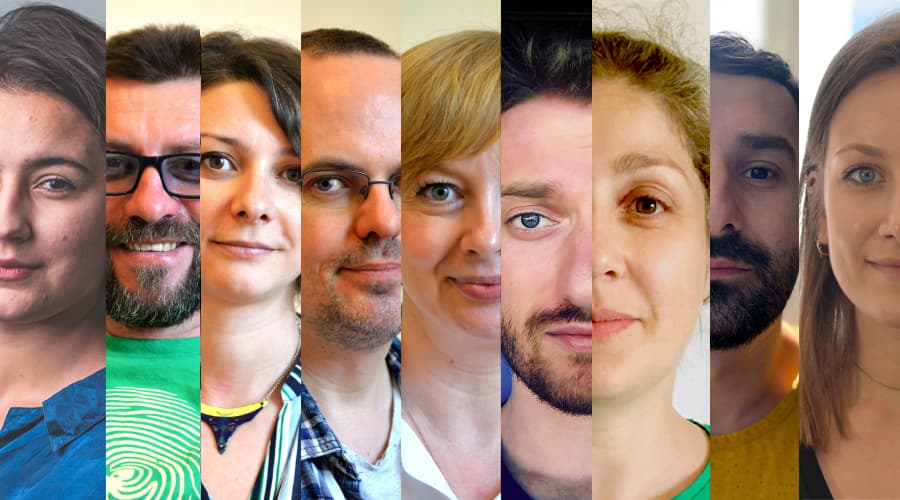
Avem nevoie de ajutorul tău!
Mulți ne citesc, puțini ne susțin. Asta e realitatea. Dar jurnalismul independent și de serviciu public nu se face cu aer, nici cu încurajări, și mai ales nici cu bani de la partide, politicieni sau industriile care creează dependență. Se face, în primul rând, cu bani de la cititori, adică de cei care sunt informați corect, cu mari eforturi, de puținii jurnaliști corecți care au mai rămas în România.
De aceea, este vital pentru noi să fim susținuți de cititorii noștri.
Dacă ne susții cu o sumă mică pe lună sau prin redirecționarea a 3.5% din impozitul tău pe venit, noi vom putea să-ți oferim în continuare jurnalism independent, onest, care merge în profunzime, să ne continuăm lupta contra corupției, plagiatelor, dezinformării, poluării, să facem reportaje imersive despre România reală și să scriem despre oamenii care o transformă în bine. Să dăm zgomotul la o parte și să-ți arătăm ce merită cu adevărat știut din ce se întâmplă în jur.
Ne poți ajuta chiar acum. Orice sumă contează, dar faptul că devii și rămâi abonat PressOne face toată diferența. Poți folosi direct caseta de mai jos sau accesa pagina Susține pentru alte modalități în care ne poți sprijini.
Vrei să ne ajuți? Orice sumă contează.
Share this



